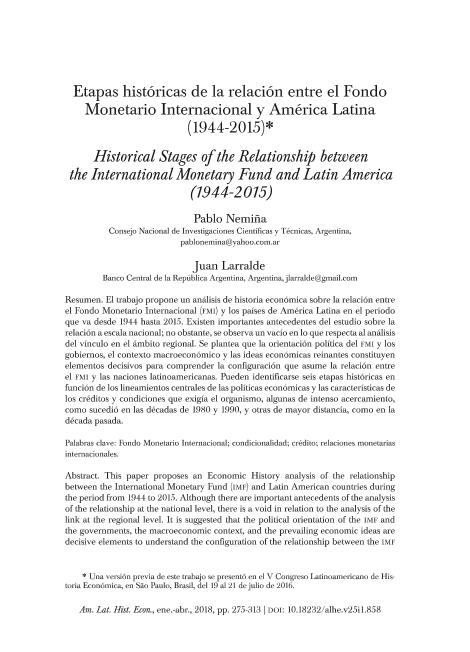Mostrar el registro sencillo del ítem
dc.contributor.author
Nemiña, Pablo Luis

dc.contributor.author
Larralde, Juan
dc.date.available
2020-03-12T20:38:37Z
dc.date.issued
2018-01
dc.identifier.citation
Nemiña, Pablo Luis; Larralde, Juan; Etapas históricas de la relación entre el Fondo Monetario Internacional y América Latina (1944-2015); Instituto de Investigaciones Dr. José María Luis Mora; América Latina en la Historia Económica; 25; 1; 1-2018; 275-313
dc.identifier.issn
1405-2253
dc.identifier.uri
http://hdl.handle.net/11336/99382
dc.description.abstract
El trabajo propone un análisis de historia económica sobre la relación entre el Fondo Monetario Internacional (fmi) y los países de América Latina en el periodo que va desde 1944 hasta 2015. Existen importantes antecedentes del estudio sobre la relación a escala nacional; no obstante, se observa un vacío en lo que respecta al análisis del vínculo en el ámbito regional. Se plantea que la orientación política del fmi y los gobiernos, el contexto macroeconómico y las ideas económicas reinantes constituyen elementos decisivos para comprender la configuración que asume la relación entre el fmi y las naciones latinoamericanas. Pueden identificarse seis etapas históricas en función de los lineamientos centrales de las políticas económicas y las características de los créditos y condiciones que exigía el organismo, algunas de intenso acercamiento, como sucedió en las décadas de 1980 y 1990, y otras de mayor distancia, como en la década pasada.
dc.description.abstract
This paper proposes an Economic History analysis of the relationship between the International Monetary Fund (imf) and Latin American countries during the period from 1944 to 2015. Although there are important antecedents of the analysis of the relationship at the national level, there is a void in relation to the analysis of the link at the regional level. It is suggested that the political orientation of the imf and the governments, the macroeconomic context, and the prevailing economic ideas are decisive elements to understand the configuration of the relationship between the imf and Latin American nations. Six historical stages can be identified according to the central guidelines of the implemented economic policies and the characteristics of the credits and conditions required by the organism, some of them of intense approach as during the 80s and 90s, and others of greater distance as in the past decade.
dc.format
application/pdf
dc.language.iso
spa
dc.publisher
Instituto de Investigaciones Dr. José María Luis Mora
dc.rights
info:eu-repo/semantics/openAccess
dc.rights.uri
https://creativecommons.org/licenses/by-nc-sa/2.5/ar/
dc.subject
FONDO MONETARIO INTERNACIONAL
dc.subject
CONDICIONALIDAD
dc.subject
CRÉDITOS
dc.subject
RELACIONES MONETARIAS INTERNACIONALES
dc.subject.classification
Otras Economía y Negocios

dc.subject.classification
Economía y Negocios

dc.subject.classification
CIENCIAS SOCIALES

dc.title
Etapas históricas de la relación entre el Fondo Monetario Internacional y América Latina (1944-2015)
dc.title
Historical Stages of the Relationship between the International Monetary Fund and Latin America
dc.type
info:eu-repo/semantics/article
dc.type
info:ar-repo/semantics/artículo
dc.type
info:eu-repo/semantics/publishedVersion
dc.date.updated
2020-03-03T15:06:22Z
dc.journal.volume
25
dc.journal.number
1
dc.journal.pagination
275-313
dc.journal.pais
México

dc.journal.ciudad
México DF
dc.description.fil
Fil: Nemiña, Pablo Luis. Consejo Nacional de Investigaciones Científicas y Técnicas; Argentina. Universidad Nacional de San Martín. Instituto de Altos Estudios Sociales. Centro de Estudios Sociales de la Economía; Argentina
dc.description.fil
Fil: Larralde, Juan. Banco Central de la República Argentina; Argentina
dc.journal.title
América Latina en la Historia Económica

dc.relation.alternativeid
info:eu-repo/semantics/altIdentifier/url/http://alhe.mora.edu.mx/index.php/ALHE/article/view/858
dc.relation.alternativeid
info:eu-repo/semantics/altIdentifier/doi/http://dx.doi.org/10.18232/alhe.858
Archivos asociados
